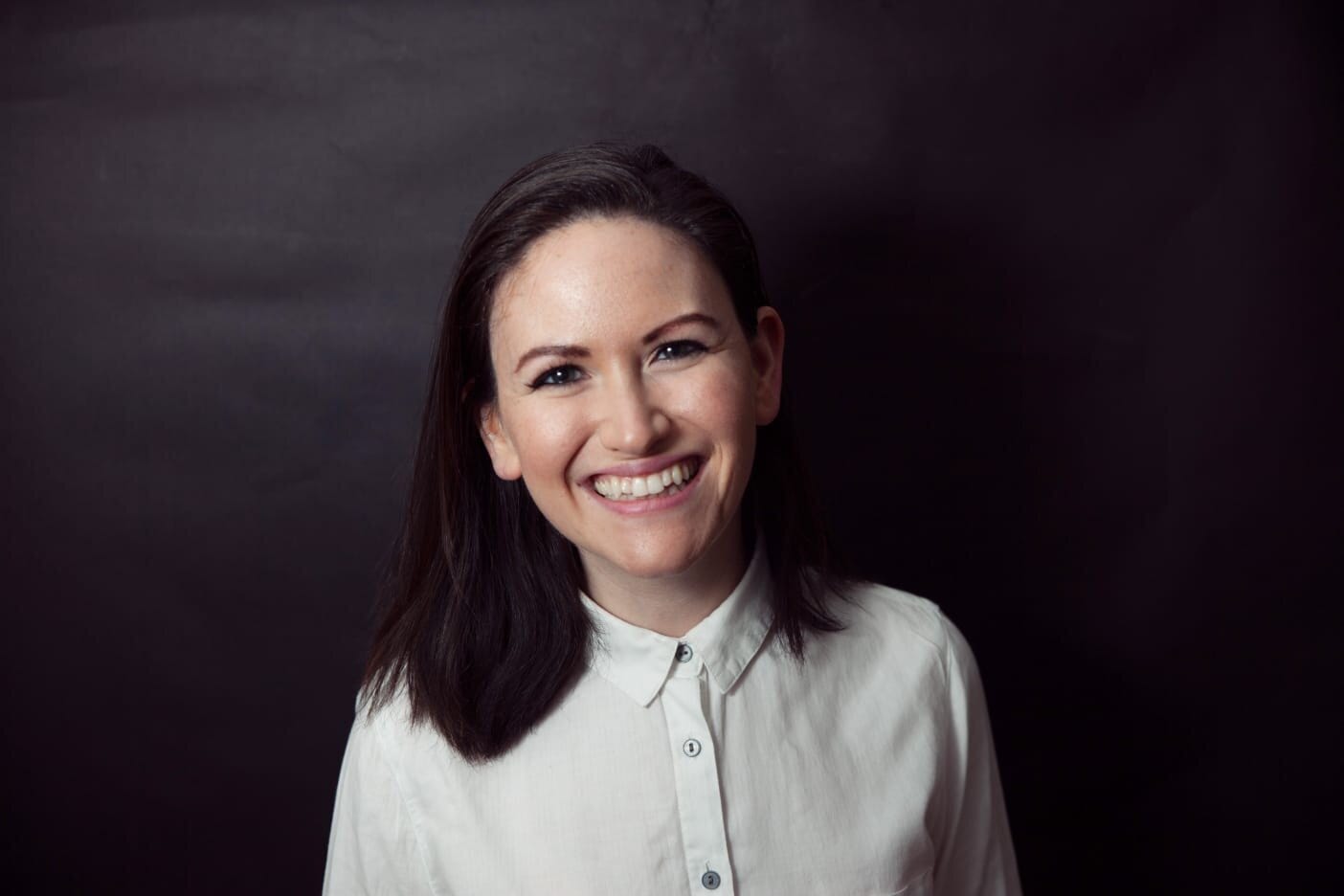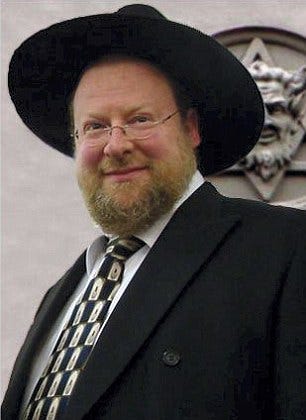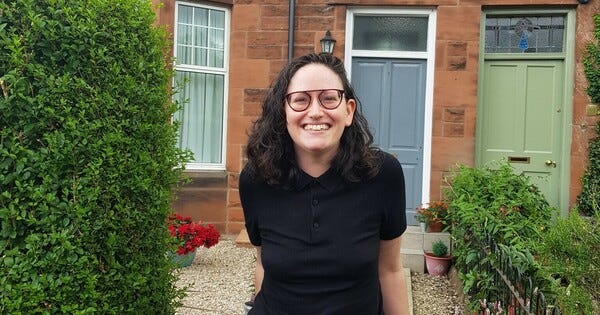Chutzpah review: religious fundamentalism must always be challenged in a modern, pluralistic society
In her unflinching memoir, Yehudis Fletcher writes compellingly about forced marriages and sexual abuse in the Charedi Jewish community
Yehudis Fletcher has been a disruptor since her childhood. Her first act of rebellion was over a piece of bread at the age of six.
Growing up in a Charedi Jewish family, one of the traditions that must be obeyed on the Sabbath is to wash your hands in a specific way before eating the challah. Cold water is poured from a cup twice over the right hand, then twice over the left.
Instead, Yehudis pretended to wash her hands to see if God really would smite her for her transgression.
“I imagined the all-seeing, all-knowing God exposing me, opening the ground beneath my seat, swallowing me, destroying me,” she writes.
The moment of truth arrived, poppy seeds tumbling from the bread that she ate with unclean hands. Nothing had changed.
“I was invincible now. Layers of restriction fell away, replaced by what felt…like endless possibility and opportunity.”
This was the first of many subversive acts from a girl who lived in a community that does not allow individuality, least of all for its women.
Chutzpah: A memoir of faith, sexuality and daring to stay is yet another act of rebellion by Yehudis, who now runs a think tank that tackles Jewish extremism. She has consulted the Government on issues such as forced marriages within her community. Oh, and she happens to be an out lesbian who brings her partner to the local synagogue.
I’ve known Yehudis for several years, having sought her knowledge on the Charedi boys in Britain who are denied secular education. So I was greatly interested in reading this memoir to find out exactly how she came to be so outspoken. And growing up Muslim, I was struck by the many similarities between Judaism and Islam.
Born in Glasgow to a father who was a rabbi, Yehudis spent most of her early years in a very insular world. Both sexes are segregated and marriages are arranged while boys and girls are still in their teens.
Charedi girls must wear modest clothes that cover their collarbone, knees and elbows. They wear thick tights even in summer. Furthermore, girls are not permitted to sing in public because “a woman’s voice is her nakedness”.
(Interestingly, some Muslims scholars believe that a woman's voice is part of her awrah, or nakedness, and should not be heard by men other than her immediate family, because it could be a source of temptation. Other scholars, however, argue that there is no clear evidence in Islamic texts to support this.)
When she was 14, Yehudis’s parents made aliyah to Israel with her and her younger sister — her four older sisters were already married. While her sibling thrived and made friends, Yehudis struggled to fit in. At one school, she was deemed a bad influence on other girls. One teacher called her “anthrax”.
It was a period of great angst; Yehudis was desperate to understand herself and the world around her, often putting her at odds with the religious and cultural expectations she faced. Little wonder that she attempted suicide (she overdosed on ibuprofen), which led to a short stint in a mental health ward.

Not knowing how to cope, her parents sent her to live with family friends in Manchester.
That’s when things took a turn for the worse. Aged 15, she went to stay with the Jewish scholar Todros Grynhaus.
She recalls one night how he entered her bedroom without permission, wearing only a white vest and boxer shorts. He offered to give her a “massage” before he “shoved two fingers inside me,” Yehudis recalls. “I felt no pain because I wasn’t in my body anymore. My soul was suspended, watching the scene from above.”
These nightly visits would continue for six months.
Yehudis doesn’t gloss over the sickening abuse. This part of the book evokes both anger and sympathy for a young girl who should never have been put in such a situation; she was failed not only by her parents (from whom she was largely estranged) but the wider community who refused to believe her.
When she told the late Rabbi Yehuda Brodie, the registrar of the Manchester Beth Din, of the abuse, he responded by asking: “Do you think you’re his first?”
The Beth Din did not report the allegations to the police. But Fletcher did not relent in her pursuit of justice.
In 2015, Grynhaus was sentenced to 13 years and two months for seven counts of sexual abuse against Yehudis and another girl.
While Fletcher points out to the incredible people who helped her (when Grynhaus fled to Israel on another man’s passport, it was a member of Manchester’s Jewish community who reported his appearance on a Tel Aviv passenger list so he could be arrested on arrival back in the UK), it’s clear that there has long been a culture of silence that allowed (and still allows) perpetrators to get away with abuse.
This happens not just among the Charedim but in several communities in Britain. The “grooming gangs”, for example, saw mostly Pakistani-heritage men raping and abusing mainly young, white girls nationwide.
But finding justice through Manchester's courts is just one part of Yehudis’s journey of self-discovery.
When she was 16 she needed to do something to fix her reputation, as she was viewed as “damaged goods”.
“If I was ever going to shake off the shadow of Todros, moving away and making myself marriageable was my only option,” Yehudis notes.
The teen returned to Israel to learn how to be a wife in a seminary and by the time she was 18, a shidduch, a match, had been found.
Danny turned out to be a violent man. While on their honeymoon in the US, he tried to strangle his bride with the strap of her handbag. Back in London, she walked in on him and their middle aged marital mentor in the bedroom. They divorced nine months later.
Yehudis was married off again, aged 19, this time to 29-year-old Zvi. She picked him on the basis that “I knew he wasn’t going to hit me.”

The marriage lasted for over a decade, and the couple went on to have three children. Zvi wanted sex constantly, something Fletcher struggled with, on account of her being a lesbian.
But saying no to your husband is not an option. Simply put, it’s a wife’s duty to provide for his sexual needs.
(Again, I’m struck by the similarities with Islam. One hadith states that a woman who refuses her husband sex is cursed by the angels all night.)
On refusing intercourse yet again, Zvi instructed Yehudis to speak to his rabbi. When she described the sex as “horrendous,” the rabbi replied, “I can give you a sedative to make it easier.”
A few weeks later, during yet another chat with the rabbi, Yehudis said she wasn’t attracted to her husband.
“You’re not attracted to any men or just him?”
“I’m not attracted to any men, including Zvi,” she stated matter-of-factly.
Yehudi’s sexuality is a major theme in the book. After struggling with accepting who she was, and hiding her true feelings, she eventually came out to her family in 2021. “Every so often, from then until now, I bend over double, winded by the excruciating cost of my freedom,” she writes, after most of them decided to cut her off.
But she has bigger battles to fight. Along with Eve Sacks, the daughter-in-law of the late Chief Rabbi Lord Sacks, she helped found the charity Nahamu, which combats the “harms arising from extremism in the Jewish community”.
Whether it is Islamic, Jewish, or Christian fundamentalism, the subjugation of women is systematic and all-pervasive. And, as we've seen time and again, the authorities are loath to intervene, partly out of being branded racist.
This was made clear to Fletcher some years ago when she asked the government’s Forced Marriage Unit to address the problem with the same diligence that they have in south Asian communities.
Campaigners told Fletcher that she was decades behind them in addressing this issue, because “there is a nervousness around antisemitism among politicians, police, health workers, and so we consistently see a lower threshold for intervention,” Yehudis said in a Times interview. “Signs that raise eyebrows in other communities do not here.”
I’ve heard some people making excuses about this, insisting that Muslim extremism is a bigger threat to the wider community, whereas Charedis, at least, are insular and don’t cause any problems to society as a whole.
But to leave Charedi communities isolated, allowing boys to go to religious seminaries instead of mainstream schools, leaving girls and boys without any sex education or any means to report abuse, where “arranged marriages” are effectively forced because there is no real option to say “no”, should not be acceptable in a modern, pluralistic society which values individual rights — or, at least, says it does.
The state should get involved as it does in all other sorts of child abuse. It shouldn't treat the Jewish communities any differently.
While Yehudis has discarded some of the rules, her long skirts, and sheitel (the wig worn by married Jewish women) she continues sending her three children to Charedi schools and remains a member of the community.
And this is the part with which I struggle the most. Why stay in a community that largely rejects you and what you stand for, that doesn’t accept your sexuality, where you must accept obey without any questions?
I get it, believers from all religions pick and choose which aspects of their faith they want to keep and which they reject. It’s normal — humans are contradictory creatures.
But every moment in the day of a Charedi Jew is mapped out — from the minute you wake up to the moment you fall asleep. There is no such thing as personal autonomy and anyone who does transgress is ostracised and disowned.
Yet even now, Yehudis buys food from the kosher shop and still hosts shabbos dinners for LGBT members of the Charedi community.
I’d have liked to know more about the impact this has had on her children, although I appreciate this may be down to Fletcher wanting to maintain their privacy. And it’s hard to know for how long she can sustain this delicate balancing act. But Yehudis remains resolute.
“The act of staying in is an act of resistance,” she explained in an interview. “No one gets to throw me out.”
Chutzpah: A Memoir of Faith, Sexuality and Daring to Stay, is available to buy now.







